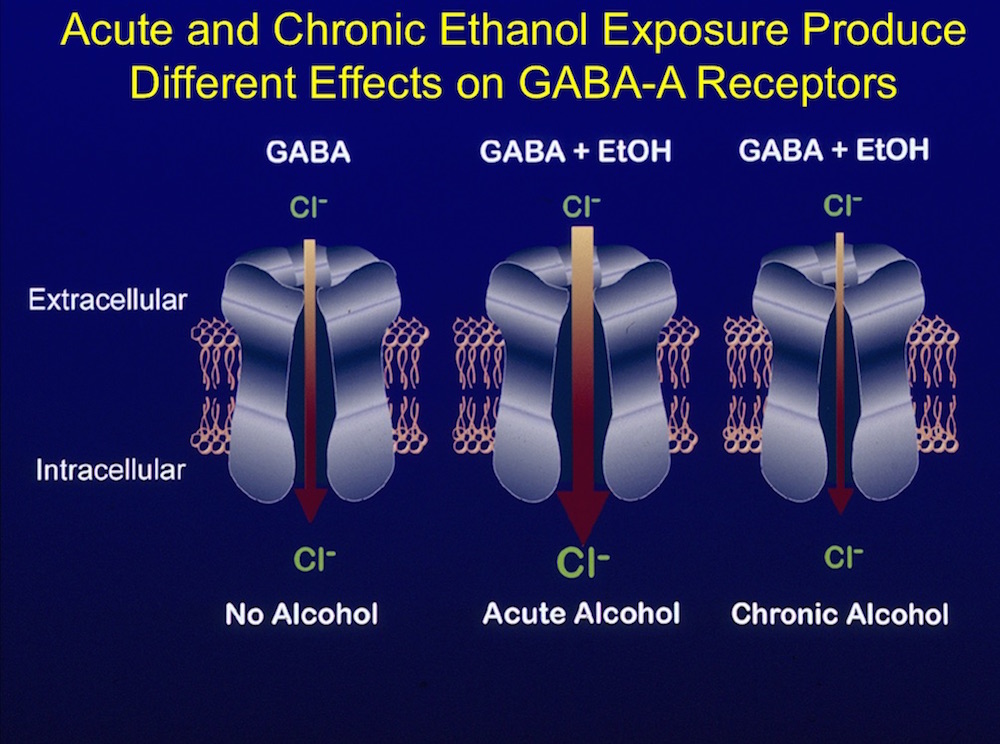
Booze snooze: Why does alcohol make you sleepy, then alert?
What's behind this weird effect?
Beer, wine and other alcoholic beverages have somewhat of a split personality in how they affect people's brains. At first, the drinks tend to make people feel super sleepy, but they then jolt those same people wide awake and make them jittery just a few hours later. What's behind this odd effect?
The answer has to do with alcohol's powerful effects on the central nervous system, said A. Leslie Morrow, a professor of psychiatry and pharmacology at the University of North Carolina School of Medicine.
Alcohol enters the bloodstream quickly, usually within about 20 minutes of a person drinking it. It's a small molecule, so once alcohol is in the bloodstream, it can easily cross the blood-brain barrier and affect brain cells, known as neurons, Morrow said.
Related: Why do we sleep?
In the brain, alcohol targets protein molecules, including GABA-A receptors, which are present on more than 80 percent of all neurons. Normally, these receptors are the destination for GABA (gamma-aminobutyric acid), a neurotransmitter (chemical messenger). Typically, GABA binds to these receptors and opens a channel, letting chloride ions move inside of neurons.
Once chloride ions enter a neuron, they act like light-switch dimmers, slowing down that neuron's firing.
"When you reduce neuronal firing, that causes relaxation, sedation, sleepiness," Morrow told Live Science. If neuronal firing drops too much, it can cause coma and ultimately death, she said.
Sign up for the Live Science daily newsletter now
Get the world’s most fascinating discoveries delivered straight to your inbox.
Alcohol enhances this effect, she explained. That's why when people drink alcohol, they feel more relaxed, more sedated and sleepier than usual. "They might have motor incoordination," Morrow added. "They might forget where they parked their car. They might not be able to concentrate on their homework."
If a person has a high alcohol tolerance, it might take a few more drinks for them to feel this way, Morrow noted. This explains why people with a low tolerance tend to feel these effects, including sleepiness, sooner than people with a higher tolerance.

But why does alcohol also disrupt sleep? Once again, the answer involves GABA-A receptors and neurons. Within about 4 to 5 hours of social drinking (having about three drinks at an event), alcohol molecules in the brain cause GABA-A receptors to loose sensitivity to alcohol and to GABA itself. When this happens, GABA-A receptors move from the surface of the neuron to the inside of the neuron, where they are degraded, Morrow said. This process is called receptor trafficking, she said.
Once GABA-A receptors are inside of the neuron, neither GABA nor alcohol can activate them, Morrow said. Without these keys to let in chloride ions and slow down neuronal firing, the neurons get excited, firing faster than usual, she said.
"That's when we wake up," Morrow said. "This effect depends on dose of alcohol and time after alcohol is consumed. The higher the dose of alcohol, the greater the effect on sleep and waking, since there is both a greater effect on neuronal inhibition and then on receptor trafficking inside the neurons."
Luckily, the body can synthesize new receptors and insert them back on the surface of neurons within a few hours, Morrow said.
This process happens differently for alcoholics, however, Morrow said.
"They've lost so many GABA receptors that they're not making new ones at the same rate anymore," Morrow said. "If they have fewer receptors, they're likely to be anxious [and] nervous, have dysphoria [a state of feeling unwell], and have trouble sleeping, just in general. That's what drives them to want to drink more. That perpetuates more drinking, and it leads to a vicious cycle."
Morrow noted that alcohol's effects on the brain are much more complicated than described here.
"Since alcohol acts on many proteins, other proteins also contribute to its inhibitory activity in the brain, as well as the excitation that wakes people in the middle of the night," she said. "[But] GABA-A receptors are very sensitive to alcohol, and [they] play a major role in the mystery of alcohol's actions."
If people wake up in the middle of the night after an evening of drinking, they should try relaxation techniques, such as deep breathing, to calm down, Morrow said. This can help keep feelings of mounting anxiety at bay, she said.
"You can obviously rev yourself up and make yourself more excited," Morrow said. "Realize that it's OK to rest. That if you can't sleep, that resting is good enough. Do things to calm yourself down, then your next day probably will be fine."
Originally published on Live Science.

Laura is the archaeology and Life's Little Mysteries editor at Live Science. She also reports on general science, including paleontology. Her work has appeared in The New York Times, Scholastic, Popular Science and Spectrum, a site on autism research. She has won multiple awards from the Society of Professional Journalists and the Washington Newspaper Publishers Association for her reporting at a weekly newspaper near Seattle. Laura holds a bachelor's degree in English literature and psychology from Washington University in St. Louis and a master's degree in science writing from NYU.









